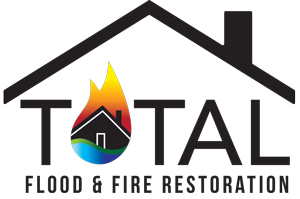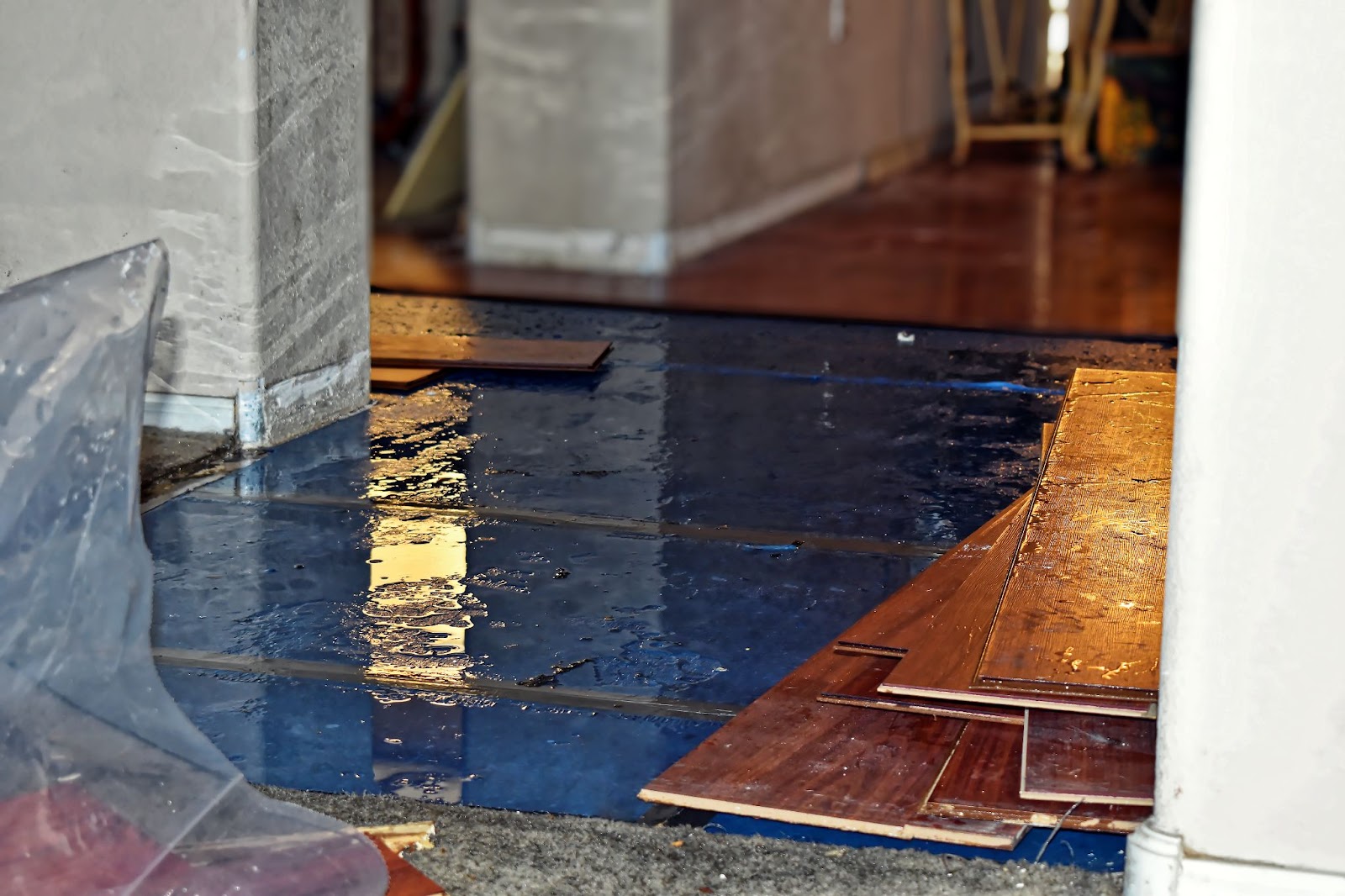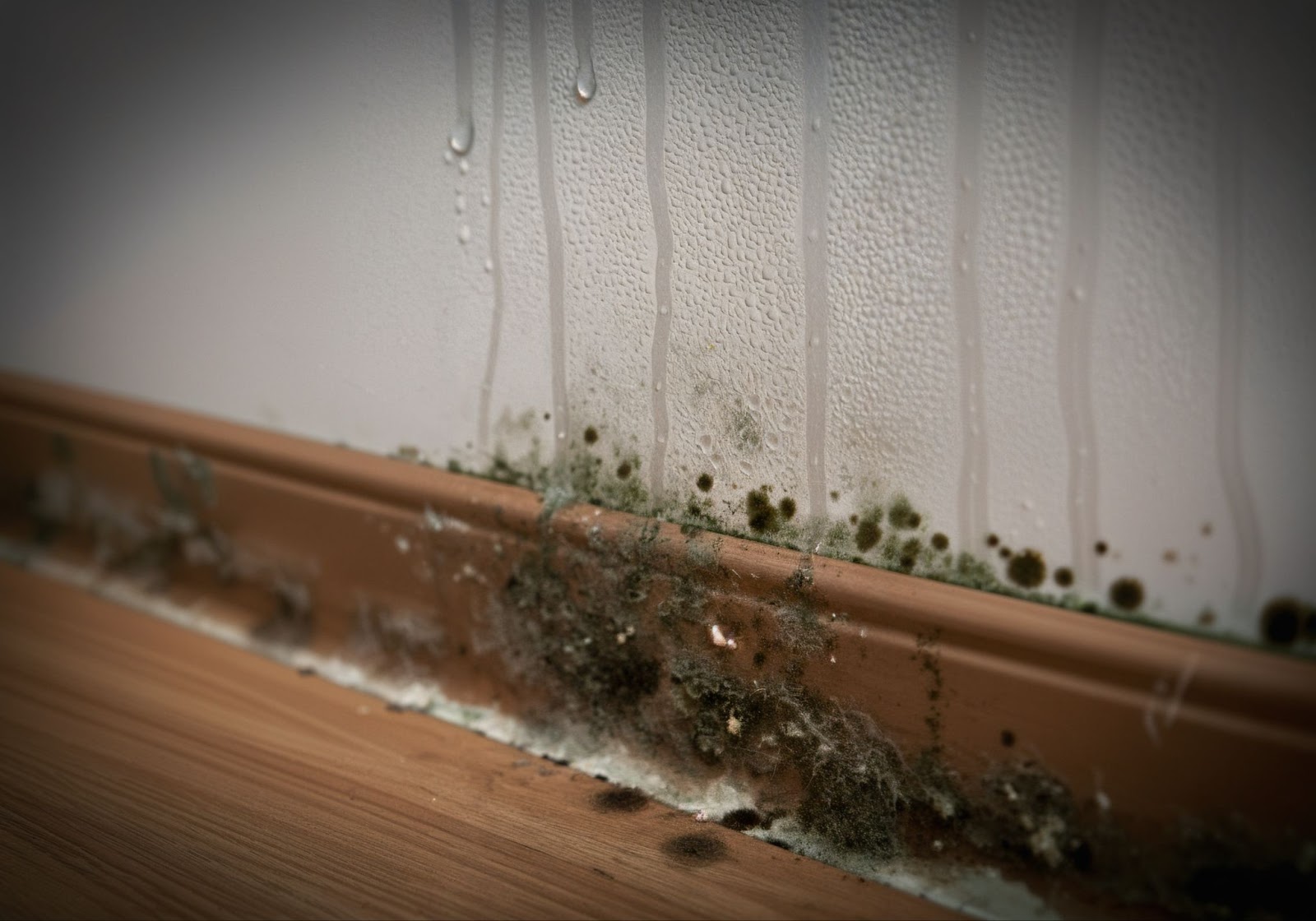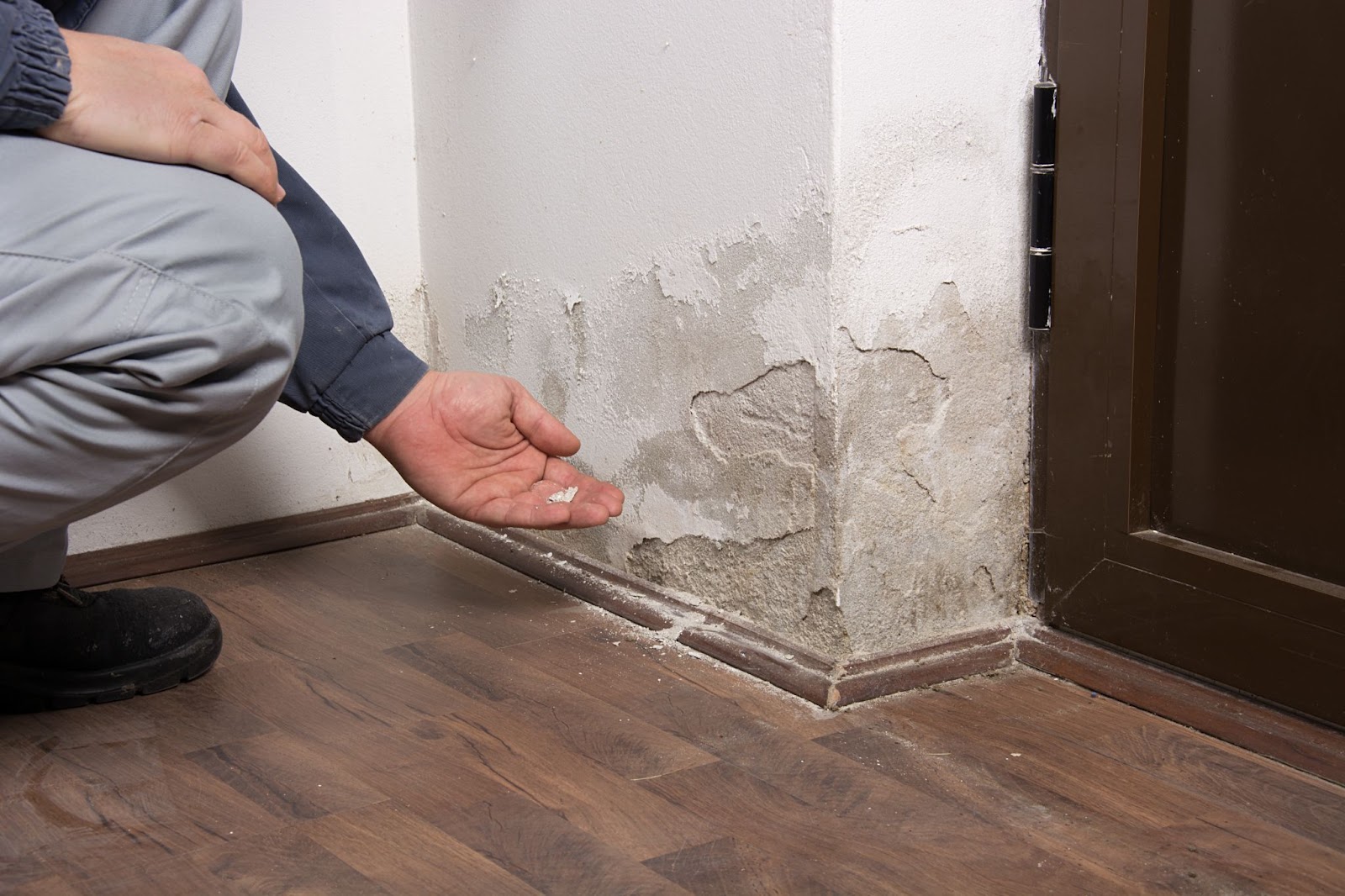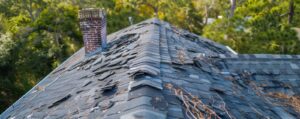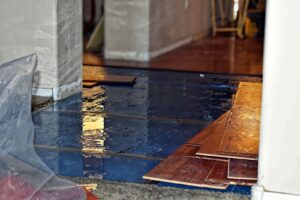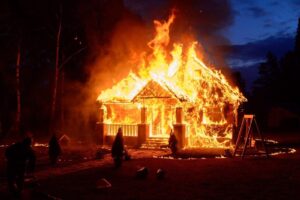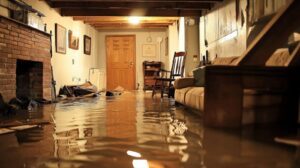Discovering water damage in your home feels overwhelming. One moment, everything seems fine — then the next, you’re dealing with soggy carpets, warped floors, or water dripping from the ceiling.
Whether the cause is a heavy storm, a burst pipe, or a leaking appliance, the damage spreads fast and demands immediate action. Understanding where the water comes from helps you act quickly.
Stormwater often floods basements or seeps through foundation cracks. Plumbing failures, like a broken pipe or overflowing toilet, quickly release large volumes of water. Faulty appliances, such as water heaters or washing machines, also create hidden leaks that, if left unchecked, lead to serious structural issues.
This guide walks you through each step to manage water damage effectively. From ensuring safety and assessing the situation to drying out your space and calling professionals, these tips help you take control, limit the damage, and start your path to restoration.
Ensure safety first
Before you assess the damage or begin cleanup, focus on safety. Water damage in your home often brings hidden hazards that can risk your health and safety.
If water reaches electrical outlets, wiring, or appliances, shut off the power at the main breaker. Do the same with your gas supply if you suspect a leak or smell gas. Always prioritize these steps before entering any flooded or water-damaged area.
Avoid touching standing water, especially if it looks discolored or smells foul. It may contain sewage, chemicals, or bacteria. If you need to inspect the area, wear waterproof boots and gloves.
Evacuate immediately if your home shows signs of serious structural damage. Cracked walls, sagging ceilings, and warped floors signal instability. In these situations, wait for emergency responders or restoration professionals to determine whether it’s safe to return.
Identify and stop the source
Once you’ve secured the area and ensured everyone’s safety, act quickly to stop the water at its source. Look for visible signs of where the intrusion started. Burst pipes, overflowing appliances, roof leaks, or foundation cracks often lead the list of culprits.
If a pipe or appliance causes the issue, immediately turn off the main water supply. This simple step prevents additional flooding and helps contain the damage to a smaller area. In storm-related events, cover any exposed areas with a tarp or waterproof material until professionals arrive.
Before cleanup begins, take photos and videos of the source and surrounding damage. Capture wide shots for context and close-ups of specific areas. Your insurance provider will want proof of the origin and scope of the damage to process your claim.
Assess the damage
After stopping the water, examine the affected area to understand the extent of the damage. Start by scanning for puddles, damp flooring, and warped surfaces. Water tends to travel fast and find low points, so look beyond the obvious. Check corners, baseboards, and behind furniture for hidden moisture.
Inspect ceilings for stains, sagging, or bubbling paint. These signs suggest that water may have traveled between floors or behind drywall. Examine walls and floors for soft spots, discoloration, or buckling, which often signal deeper structural damage.
Look closely at rugs, furniture, and nearby belongings. Upholstered items absorb water quickly and may start to smell or discolor. Don’t overlook cabinets or closets near the affected area; they may hold moisture even if they appear dry at first glance.
Stay alert for early signs of mold or mildew. A musty smell, black or green spots, or fuzzy textures mean mold has started to grow. Mold can develop within 24 to 48 hours, especially in warm or poorly ventilated spaces.
A thorough inspection helps you decide what to salvage, what to dry out, and what to remove. Document everything with photos or videos to support your insurance claim and restoration plan.
Document everything
Careful documentation lays the foundation for a successful insurance claim and smooth restoration process. As soon as it’s safe, photograph every affected area in detail. Capture wide shots for overall context and close-ups that show damage to floors, walls, ceilings, and fixtures. Snap pictures of water stains, warped wood, peeling paint, and mold growth.
Record a video walkthrough to provide a comprehensive view of your home’s condition. Narrate what you see as you move through the rooms, noting any damage that may not be obvious in still photos.
Next, list every item impacted by the water. Include furniture, electronics, clothing, and personal items. For each, jot down a description, approximate value, and purchase date (if you have that information available). Attach receipts, warranty documents, or photos from before the damage when possible. This inventory will help your insurance provider determine reimbursement amounts more efficiently.
Save receipts for emergency repairs, hotel stays, or supplies like fans and tarps. Depending on your policy, these costs may qualify for reimbursement. Staying organized during this chaotic time helps you recover faster and keeps your claim on track.
Contact your insurance provider
Act quickly to report the damage to your insurance company. The sooner you file a claim, the faster you can start the recovery process. Provide your insurer with a detailed description of the incident, including when and how the water damage occurred. Mention any immediate actions you’ve taken, such as shutting off the water supply or making temporary repairs.
Review your policy to understand what it covers. Standard homeowners insurance typically includes water damage from burst pipes, appliance leaks, and roof failures. However, it usually excludes flooding caused by rising groundwater or heavy rain unless you carry separate flood insurance. Knowing the difference helps you avoid surprises during the claims process.
Once your claim is in motion, schedule a visit from the insurance adjuster. Walk them through the damaged areas, provide photos, videos, and your inventory list, and answer any questions they have. Clear communication ensures a more accurate evaluation and helps you secure the compensation you need for repairs and replacements.
Begin water removal and drying
Start extracting water from your home as soon as possible to minimize damage and avoid long-term complications. Use a wet/dry vacuum to remove standing water from floors, rugs, and low areas. Focus on high-traffic zones and places where moisture collects, like corners and under cabinets.
Set up high-powered fans and dehumidifiers to speed up the drying process. Position them strategically to circulate air and reduce moisture in walls, flooring, and furniture. If weather permits, open windows and doors to improve ventilation and airflow.
Remove waterlogged carpets, furniture, and personal items to reduce the risk of mold and structural damage. Place wet items outside or in a well-ventilated area and determine what’s salvageable. Some materials absorb moisture quickly and may require professional restoration or disposal.
Thorough drying prevents mold growth and hidden water damage in your home. Monitor humidity levels with a hygrometer and keep equipment running until all affected areas feel completely dry. When in doubt, consult professional restoration experts to ensure your space reaches safe moisture levels.
Call in professional help
If water damage appears widespread, hidden, or overwhelming, bring in certified water damage restoration experts right away. Their experience, tools, and training ensure your home receives a thorough evaluation and targeted treatment.
Professionals use moisture detection technology to uncover water trapped behind walls, under floors, and inside building materials. This early detection helps prevent mold growth, which thrives in damp, dark spaces and spreads quickly. By addressing the root of the problem, restoration teams stop further damage and protect your home’s structure.
When you hire a trusted restoration company, you can expect a comprehensive cleanup and repair process. Crews begin by assessing the extent of the damage, then use industrial equipment to extract moisture and sanitize affected areas. They handle everything from drying and mold remediation to drywall repair and odor removal.
Many also coordinate directly with insurance companies to simplify the claims process. Professional restoration gives you peace of mind during a stressful time. With experts guiding the recovery, you restore your home safely, quickly, and confidently.
Prevent future water damage
Once your home recovers from water damage, take proactive steps to avoid repeat issues. Prevention saves time, money, and stress and protects your property from long-term structural problems.
Start by inspecting your plumbing system and appliances on a regular schedule. Look for worn hoses, loose fittings, rust, or leaks near water heaters, washing machines, dishwashers, and HVAC units. Replace aging components before they fail.
Waterproof basements and crawl spaces to create a moisture barrier. Use sealants on foundation walls, install sump pumps with battery backup, and consider vapor barriers for added protection. These upgrades help keep groundwater and rain runoff from seeping into your home.
Lastly, maintain your home’s exterior drainage. Clean gutters and downspouts to prevent water overflow. Extend downspouts several feet away from the foundation and ensure the soil around your home slopes away to direct rainwater safely. A strong exterior defense reduces the risk of indoor flooding and mold.
Restore your peace of mind with expert help from Total Flood and Fire Restoration
For thorough, professional support, trust Total Flood and Fire Restoration. Our certified team responds quickly, effectively removes moisture, and restores damaged areas with precision and care. Whether you’re facing a burst pipe, basement flood, or storm damage, we deliver reliable results and peace of mind when you need it most.
Contact Total Flood and Fire Restoration, and let us help you take the next step toward a clean, dry, and safe home.
